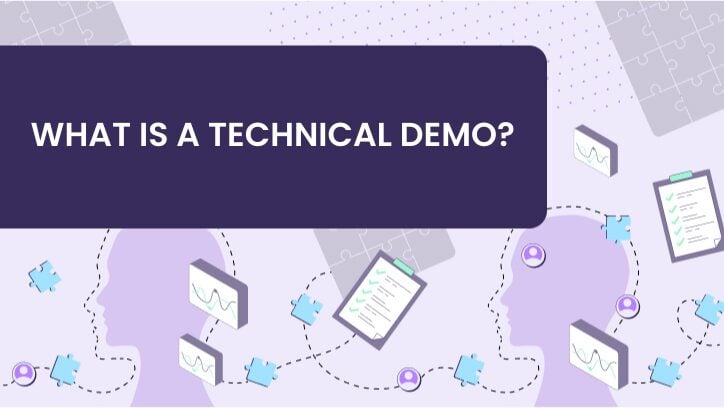A technical demo is a live or recorded demonstration of a product, usually software, that shows how it works, what problems it solves, and how the user interacts with it. Technical demos are common in B2B sales, SaaS platforms, and product-led growth environments, as they display what the product is capable of in a practical way.
This interactive technical presentation is not just a regular presentation or marketing overview of a product – it provides a more in-depth software feature demo and real workflows. It may be in a developer product demo or an engineering-led demo format. It demonstrates how a tool can fit into a prospective customer’s ecosystem, often within a pre-sales demo environment or a product sandbox.
A great technical demo solidifies the gap between interest and commitment, allowing prospective customers to envision how the product will work for them before ever making the purchase.
IMPORTANCE OF THE TECHNICAL DEMO
The real-time software demo represents a critical juncture in the sales cycle. When conducted correctly, a technical demo legitimizes product claims while engaging with the buyer’s emotional connection to their pain points. For a sales team and customer success organization, a successful demo could mean the difference between a successful and an unsuccessful sale.
And tools like Walnut serve as powerful demo automation tools to create personalised, scalable, code-free demos that are interactive and streamlined to get buyers engaged.
HOW TO CREATE A TECHNICAL DEMO
Creating a technical demo does not have to be stressful. The following is a general framework that may help you construct an effective, buyer-centric demo experience.
Step 1: Define Your Demo Objectives
Before diving straight into screens and widgets, it is critical to ask yourself: What do I expect to achieve with this demo? For instance, you might want your audience to sign up for a free trial, understand how your product functions, or recognize its benefits over rivals. So set your primary objective and break it down into specific and measurable results. Write down your goals and use them to direct the demo’s content, structure and delivery.
Step 2: Identify Your Target Audience
Who will be watching this demo? Is it a CTO, a sales leader, or an end user? You must know who you are speaking to, what they are interested in, and what they need to know before you can create your technical demonstration. Understand the history, interests, and pain points of your audience. Tailor your demo showcase or user flow demo to resonate with their preferences for a successful outcome. And don’t forget to engage your audience actively through the in-app demo experience.
Step 3: Select the Right Tool (e.g Walnut)
You need to choose the best tools for your technical demonstration. It can be virtual product tours, shareable demos or interactive software simulations. Walnut is one such platform that provides you the ability to create interactive, codeless demos that may be embedded on your website, shared with a prospect, or used during a live call. The best thing about using Walnut is its ability to personalize demos at scale, track usage analytics and reduce dependency on engineering resources.
Step 4: Build a Clear Narrative
Every good demo has a story. Make sure you structure it well around the user journey. This will help you organize the information, create a logical flow and engage your audience.
- What is their pain point?
- What does your product do to alleviate it?
- What is the result or change?
- Avoid listing features; instead, focus on context value.
Step 5: Build the Demo Experience
No one likes to sit through a one-hour talk, so use interactive code labs to make your demo interesting and memorable. Utilize your demo platform to capture your product flow, whether in a recording, simulation, or mockup. Keep it visual, clean, and intuitive while flowing in a logical way. Show pertinent actions with visible workflows to leave an impression.
Step 6: Test & Refine
No matter how good you are with your solutions, chances are you might come across at least one or two challenges during the demo. That’s why it’s a good idea to run the demo internally first, get feedback and look for unclear transitions, technical failures and irrelevant information. Once you have run it, you can refine for clarity, speed and purpose.
While you are talking, platforms like Walnut allow you to tweak the custom feature walkthrough or improve the cloud software demo without writing any code, making testing and updating fast and efficient. In short, a solid technical demo should feel organic and natural to the user.
TIPS FOR A GREAT TECHNICAL DEMO
Your technical demo can make or mar your sales. This article will give you some of the best tips from the experts to create a great technical demo.
Simple and Focused
Don’t overload people with content. Your SaaS demo tools should highlight the key features or use cases relevant to your audience. A complex demo with many jargons and too many details or images can overwhelm the buyers with information. Your task is to make this demo look as simple and realistic as possible.
Create a Story
Your demo storytelling techniques can prove to be a game-changer for your product. The audience can lose interest quickly in a point-and-click demo. You can demonstrate how your solutions can solve identified problems and back your claims with examples or personal stories. Telling stories is a great way to keep your audience engaged and entertained.
Customize each Demo
You need to personalize your demo, providing tailor-made solutions to address the specific needs of your customers. Use platforms that allow multi-langugage demo setup. For example, Walnut allows you to customize and personalize your product demo content dynamically, based on prospect data or sales context. So next time, remember to be customer-centric in your technical demo.
Highlight Business Value
A technical demo will usually involve elements of features and functionality; however, instead of saying, “This is what our dashboard can do for you,” try saying, “This dashboard will help your team save 10 plus hours per week each on manual reports.” That is conveying business value. You can make the features meaningful by tying them to the business outcomes. In short, focus on the value that your product gives.
Live and Self-Directed Use
Offer both live demo sessions and self-paced sandbox demos. Make sure to design both types. When creating the self-directed demos, think about how you can make it intuitive for the user, and include tooltips and short walkthroughs where it makes sense.
Get Feedback and Improve
When you send out a demo, ask for feedback: “What did you find helpful? What did you find confusing?” Walnut can provide you with demo analytics, so you can see what’s working, where your customers are engaged and refine accordingly. Use demo feedback collection tools. The more you measure your demo, the more you can improve upon it.
HOW TECHNICAL DEMOS HELP DRIVE SALES
Shortened Sales Cycle
A great proof of concept demo shows how a product works upfront. During demos, the sales team can respond to queries and issues in real-time, address the pain points of the prospect and provide solutions, thereby accelerating the decision-making process. This can lead to faster deal closures.
Building Trust & Credibility
Seeing is believing. When a customer views your software prototype presentation, they can see how your tool fits into their process, and hence begin to trust you and your claims. This further increases their engagement, convincing them to buy from you. In the end, it’s a win-win for both; they have a great product/service, and your credibility gets established.
Empowering Sales Rep
With pre-built or personalised demos, sales teams no longer have to rely on the Product Managers or Engineering teams anymore. Tools like Walnut allow the sales team to deliver demos as needed with a new level of agility. Through technical demos, the sales team can provide tangible proof of the product’s benefits and establish a good rapport with the customer.
Increasing Conversion Rates
As per industry reports, leads who view and/or interact with a technical enablement demo are much more likely to convert to opportunities and ultimately convince them to buy. Even when the prospect doesn’t buy right away, a follow-up after a demo ensures your product stays in their mind. A positive buyer experience also increases the likelihood of closing a deal.
CONCLUSION & KEY TAKEAWAYS
A technical demo is a product walkthrough that shows how your tool can solve real-world problems. With the rise of SaaS onboarding experiences, internal training demos, the humble technical demo plays a vital role.
They are goal-driven, personalised, interactive and focused on business value. Platforms like Walnut simplify the process of deploying an engineering-led demo or running a customer onboarding demo by eliminating the need to write code.
So if you want to bring your demos into the modern world, Walnut is a safe place to start. The platform features an easy-to-use builder, analytics and personalization features that make it a go-to platform for teams to convert more prospects faster. Great demos build trust, shorten sales cycles and enable teams.





